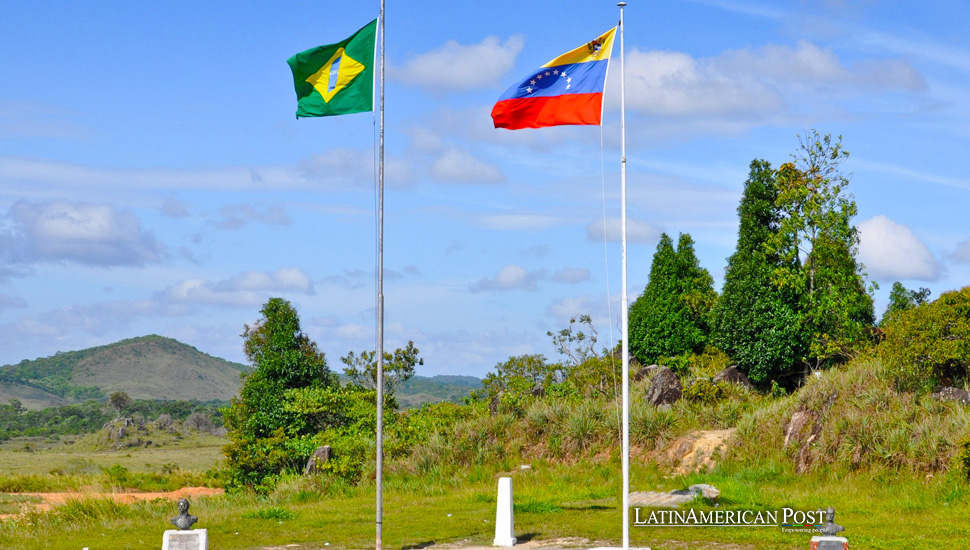Brazil Bolsters Northern Border Amid Venezuela-Guyana Esequibo Tensions

In response to the ongoing territorial dispute over Guyana’s Esequibo region, Brazil has dispatched a convoy of military trucks and armored vehicles to its northern border, reinforcing its army presence and underscoring its commitment to national sovereignty and regional stability.
Amidst South America’s dense jungles and remote landscapes, a significant military mobilization is underway as Brazil takes proactive steps to reinforce its northern borders. This move comes in light of escalating tensions between Venezuela and Guyana over the contested Esequibo region. This dispute has drawn international attention due to its potential implications for regional stability and sovereignty.
A convoy consisting of more than two dozen armored cars made its way to Manaus, arriving by river transport. From there, portions of the convoy proceeded by road to Boa Vista, the capital of Roraima state. This strategic deployment aims to bolster the local garrison to 600 soldiers, according to a statement from the Brazilian army. The reinforcements brought an array of military hardware, including six Cascavel armored cars equipped with 37-mm cannons, eight Guarani personnel carriers, and 14 Guaicuru multitask light armored vehicles, showcasing Brazil’s readiness to defend its territory and uphold its sovereign interests.
A Serious Approach to Geopolitical Challenges
The decision to triple the equipment and workforce at the Boa Vista garrison, transforming it into a regiment, is a testament to Brazil’s serious approach to the unfolding geopolitical situation. Army Commander General Tomas Paiva emphasized the army’s role in guaranteeing national sovereignty, expressing a firm belief in resolving disputes through peaceful, diplomatic means. This commitment was evident as part of the force remained in Boa Vista while another segment was deployed further north to Pacaraima, right on the border with Venezuela.
The Esequibo region, a sprawling 160,000-square-kilometer area more than twice the size of Ireland, lies at the heart of this dispute. Venezuela’s renewed claim on the territory, rich in oil and gas deposits discovered offshore, has reignited a centuries-old conflict that threatens to upset the delicate balance of peace in the region. In recent developments, Venezuela and Guyana pledged at a meeting in St Vincent and the Grenadines not to escalate tensions or resort to force, a commitment reaffirmed during a mediation session hosted by Brazil.
Despite these diplomatic efforts, the specter of military conflict looms large. Brazil explicitly states its opposition to any Venezuelan attempts to use its territory in Roraima as a staging ground for an invasion of Esequibo. As seen by Reuters, A Brazilian Joint Chiefs of Staff report assessed Venezuela’s military capabilities and concluded that Caracas lacks the logistical capacity for such an incursion. This seven-page document outlines a contingency plan to prevent any Venezuelan military action against Guyana from crossing through Brazilian soil. However, it optimistically notes that a clash between Brazil’s neighbors is unlikely due to the emerging peaceful resolution.
Balancing Defense and Diplomacy
Brazil’s military deployment is not just a demonstration of its defensive capabilities but also a signal of its commitment to peace and stability in South America. By positioning itself as a mediator and a deterrent to conflict, Brazil plays a critical role in navigating the complex dynamics of regional geopolitics. The situation remains fluid, with the potential for diplomatic breakthroughs and challenges.
Also read: Venezuela-Guyana Dispute Leads to Diplomacy in Brazil Over Oil-Rich Esequibo
As the international community watches closely, the actions taken by Brazil underscore the importance of sovereignty, the rule of law, and the pursuit of peaceful resolutions to disputes. The reinforcement of Brazil’s northern border serves as a reminder of the country’s readiness to protect its interests while advocating for diplomacy and dialogue. In a region marked by its rich history and diverse cultures, the hope remains that a lasting solution can be found, ensuring the safety and prosperity of all involved parties in the Esequibo dispute.





